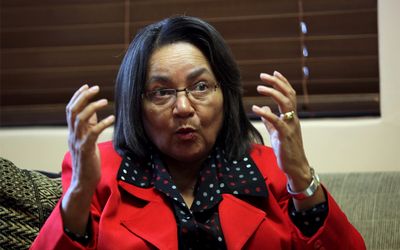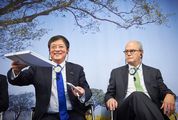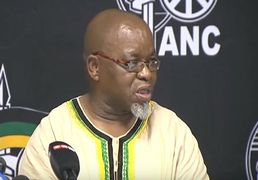THE city of Cape Town says it will next month advertise a multimillion-rand tender for the procurement of a fleet of 12m-long electric buses, in line with its commitment to lowering carbon emissions.
The city is also considering electric double-decker buses for longer distance trips.
The tender, worth R50m over two years, specifies that the electric buses should be able to travel at least 250km in traffic before the batteries need recharging.
"Apart from the buses, the successful bidder must also provide the city with the charging stations for the buses and the necessary training for the bus drivers and mechanical engineers," Cape Town Mayor Patricia de Lille said on Wednesday.
The metro is also undertaking a research project into biofuels to determine how it can make use of alternative energy sources to run a cleaner and more fuel-efficient MyCiTi bus service.
China and the US have been experimenting for some years with electric cars to reduce dependence on fossil fuels and to curb air pollution.
British futurologist Ian Pearson has forecast that in 2026, the electric car will overtake its petrol-powered cousins in terms of global sales.
Last year, Nissan SA and BMW said they would collaborate to advance electric vehicle and plug-in hybrid vehicle adoption in the country. The vehicle manufacturers have agreed jointly to plan and build a national grid of charging stations that would power electric cars.
Ms de Lille — who uses of a hybrid car as her official mayoral vehicle — said apart from electric buses being ecofriendly with zero carbon emissions if solar power charging stations were used, a green fleet held numerous other advantages.
"The operational cost of electric buses is significantly lower — not only in terms of fuel, but also in relation to maintenance, as there are fewer parts to service," the mayor said.
"Electric buses are easier to drive, the motors generate less heat than traditional diesel engines, there is much less noise, and it is a smoother drive for passengers and bus drivers alike."
Ms de Lille added that Transport for Cape Town, the city’s transport authority, had researched, and was exploring, the most appropriate mechanism for the procurement of solar technology to offset the energy required for the electric bus fleet, thereby further reducing emissions.
This initiative directly supports Cape Town’s commitment to the Paris pledge for action at COP21 and as a member of the C40 Cities, to take progressive action and lead the way in reducing energy consumption and emissions, the mayor said.
"The City’s Energy 2040 Strategy sets carbon targets and projects like this will help to ensure that we reach them... as we reduce our carbon footprint, Transport for Cape Town will earn carbon credits, which the city will be able to sell to developed countries who are signatories to the Kyoto Protocol.
"This will generate much-needed revenue for the city and result in public transport benefits for residents, making this investment even more worth our while," said Ms de Lille.

Cape Town mayor Patricia de Lille. Picture: SUNDAY TIMES
THE city of Cape Town says it will next month advertise a multimillion-rand tender for the procurement of a fleet of 12m-long electric buses, in line with its commitment to lowering carbon emissions.
The city is also considering electric double-decker buses for longer distance trips.
The tender, worth R50m over two years, specifies that the electric buses should be able to travel at least 250km in traffic before the batteries need recharging.
"Apart from the buses, the successful bidder must also provide the city with the charging stations for the buses and the necessary training for the bus drivers and mechanical engineers," Cape Town Mayor Patricia de Lille said on Wednesday.
The metro is also undertaking a research project into biofuels to determine how it can make use of alternative energy sources to run a cleaner and more fuel-efficient MyCiTi bus service.
China and the US have been experimenting for some years with electric cars to reduce dependence on fossil fuels and to curb air pollution.
British futurologist Ian Pearson has forecast that in 2026, the electric car will overtake its petrol-powered cousins in terms of global sales.
Last year, Nissan SA and BMW said they would collaborate to advance electric vehicle and plug-in hybrid vehicle adoption in the country. The vehicle manufacturers have agreed jointly to plan and build a national grid of charging stations that would power electric cars.
Ms de Lille — who uses of a hybrid car as her official mayoral vehicle — said apart from electric buses being ecofriendly with zero carbon emissions if solar power charging stations were used, a green fleet held numerous other advantages.
"The operational cost of electric buses is significantly lower — not only in terms of fuel, but also in relation to maintenance, as there are fewer parts to service," the mayor said.
"Electric buses are easier to drive, the motors generate less heat than traditional diesel engines, there is much less noise, and it is a smoother drive for passengers and bus drivers alike."
Ms de Lille added that Transport for Cape Town, the city’s transport authority, had researched, and was exploring, the most appropriate mechanism for the procurement of solar technology to offset the energy required for the electric bus fleet, thereby further reducing emissions.
This initiative directly supports Cape Town’s commitment to the Paris pledge for action at COP21 and as a member of the C40 Cities, to take progressive action and lead the way in reducing energy consumption and emissions, the mayor said.
"The City’s Energy 2040 Strategy sets carbon targets and projects like this will help to ensure that we reach them... as we reduce our carbon footprint, Transport for Cape Town will earn carbon credits, which the city will be able to sell to developed countries who are signatories to the Kyoto Protocol.
"This will generate much-needed revenue for the city and result in public transport benefits for residents, making this investment even more worth our while," said Ms de Lille.




























Change: -0.47%
Change: -0.57%
Change: -1.76%
Change: -0.34%
Change: 0.02%
Data supplied by Profile Data
Change: -1.26%
Change: -0.29%
Change: -0.47%
Change: 0.00%
Change: -0.42%
Data supplied by Profile Data
Change: 1.39%
Change: 1.38%
Change: 1.07%
Change: 1.03%
Change: 1.17%
Data supplied by Profile Data
Change: 0.12%
Change: -0.31%
Change: 0.39%
Change: -1.21%
Change: -2.39%
Data supplied by Profile Data